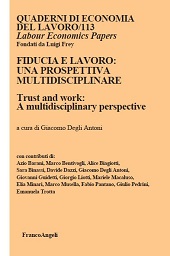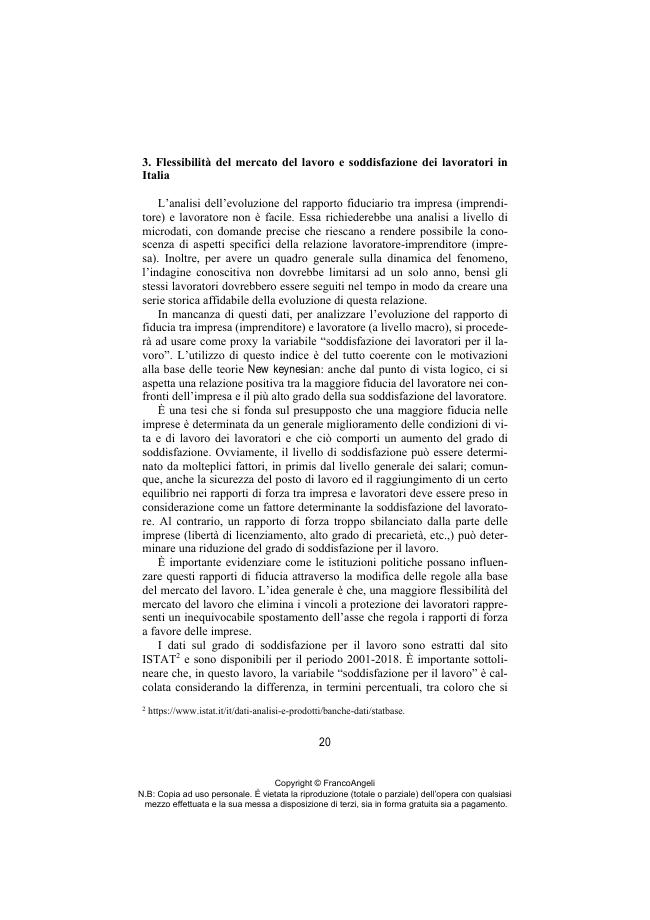Flessibilità e soddisfazione per il lavoro : una riflessione generale
P. 13-27
Negli ultimi venticinque anni, l'Italia ha profondamente modificato il quadro delle regole generali alla base del funzionamento del mercato del lavoro (Blan-chard et al., 2014; Bassanini e Duval, 2006; O'Higgins, 2012; Dutt et al., 2015; Brancaccio et al., 2018; Arestis and González-Martínez, 2015; Liotti, 2020; 2021). Con l'obiettivo dichiarato di favorire l'aumento dell'occupazione e l'ingresso dei giovani nel mondo del lavoro, si sono - di fatto - applicate ricette di stampo neoliberista che hanno progressivamente portato ad una maggiore flessibilizzazione del mercato del lavoro.
Uno dei problemi che non ci risulta sia stato analizzato dagli studiosi del mercato del lavoro è l'impatto di questo cambiamento di regole sul rapporto di fiducia tra imprenditori e lavoratori. In altre parole, come l'introduzione delle politi-che di flessibilità, che hanno reso via via il lavoro più instabile e precario, ha influito sulla sinergia tra lavoratore ed imprenditore, sinergia che rappresenta (come teo-rizzato da un filone interessante della letteratura sugli efficiency wages della teoria New-keynesian) uno dei pilastri del successo dell'impresa capitalista (per una ras-segna di questi modelli degli anni 80, si veda Jossa-Musella, 1996, cap. 20).
Lo scopo di questo lavoro è iniziare a colmare questa lacuna, analizzando la dinamica del rapporto tra flessibilità del mercato del lavoro e soddisfazione per il lavoro (come proxy della fiducia dei lavorati nell'impresa) in Italia nel periodo compreso tra il 2001 e il 2018. Facendo uso della semplice statistica descrittiva (senza la presunzione di voler dare risposte semplici ad un tema così complicato, sia dal punto di vista teorico che empirico), si possono sottolineare due risultati principali: i) considerando il periodo 2001-2008, ad una maggiore flessibilità del mercato del lavoro si associa una repentina riduzione della soddisfazione dei lavoratori; ii) analizzando invece il periodo 2009-2018, tale relazione inversa sembra svanire.
Già solo questa evidenza testimonia che le questioni da approfondire sono diverse e interessanti: si tratta, per esempio, non solo di studiare in modo più approfondito la relazione astratta tra flessibilità del mercato del lavoro e soddisfazione per il lavoro bensì, anche di indagare sui fattori economici, sociali e politici che sono alla base del mutamento dinamico del trend nei due diversi periodi considerati e, anche, ad esempio, di comprenderne l'impatto sulla produttività. [Testo dell'editore]
Over the last twenty-five years, Italy has profoundly changed the framework of the general rules underlying the functioning of the labour market (Blanchard et al., 2014; Bassanini e Duval, 2006; O'Higgins, 2012; Dutt et al., 2015; Brancaccio et al., 2018; Arestis and González-Martínez, 2015; Liotti, 2020; 2021). With the declared goal of encouraging the increase in employment and the entry of young people into the world of work, neo-liberal recipes have been applied, making, in this way, more flexible the labour market. One of the problems not analysed by scholars of the labour market is how this change of rules has influenced the relationship of trust between entrepreneurs and workers.
In other words, like the introduction of flexibility policies, which have gradually made work more unstable and precarious, have influenced the synergy between worker and entrepreneur which - according to New Keynesian theory - represents one of the pillars of the success of the capitalist enterprise. The purpose of this work is to begin to fill this gap, analysing the dynamics of the relationship between labour market flexibility and job satisfaction (as a proxy of the confidence of workers in the company) in Italy in the period between 2001 and 2018. Using simple descriptive statistics (without the presumption of wanting to give simple answers to such a complicated topic, both from a theoretical and empirical point of view), two main results can be underlined:
i) Considering the period 2001-2008, to a greater labour market flexibility is associated with a sudden reduction of job satisfaction; ii) Analysing the period 2009-2018, the inverse relationship between labour market flexibility and job satisfaction seems to vanish. This evidence should stimulate scholars to analyse more thoroughly also other issues related to flexibility: it is a question, for example, not only of studying in greater depth the abstract relationship between labour market flexibility and job satisfaction, but also of investigating the economic, social and political factors that are the basis of the dynamic change in the trend in the two different periods considered and, also, for example, to understand the impact on productivity. [Publisher's text]
Forma parte de
Quaderni di economia del lavoro : 113, 1, 2021-
Artículos del mismo número (disponibles individualmente)
-
Información
Código DOI: 10.3280/QUA2021-113002
ISSN: 1971-8470
KEYWORDS
- Flessibilità, Mercato del lavoro, Soddisfazione dei lavoratori
- Flexibility, Labour market, Job satisfaction



